All products featured are independently chosen by us. However, SoundGuys may receive a commission on orders placed through its retail links. See our ethics statement.
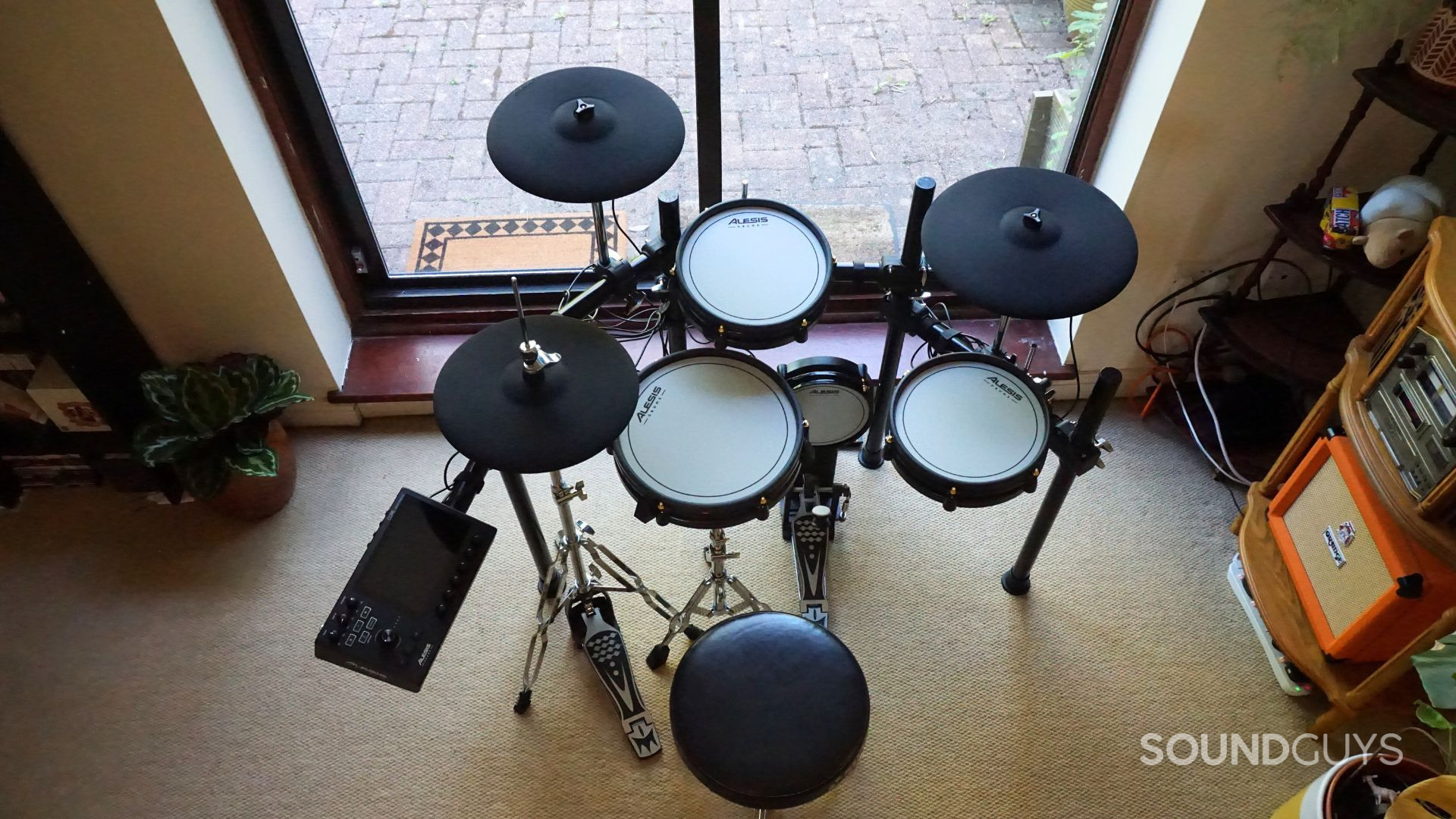

Every electronic drum kit needs this feature - Alesis Strata Club review
May 11, 2025


Alesis Strata Club
Weight: 24,498.0g
Digital instrument manufacturer Alesis refreshes its electronic drum kit catalog with the new and improved Alesis Strata Club. Sitting firmly as its cheapest and most compact Strata-series offering, we’ve tested how it stacks up against its siblings and the wider competition. Do drummers receive all the features necessary for practice, live performance, and recording in 2025? Find out in our Alesis Strata Club review.
This article was published on May 11, 2025, and this is the first version of the article. Updates will follow as the market changes.
What I like about the Alesis Strata Club
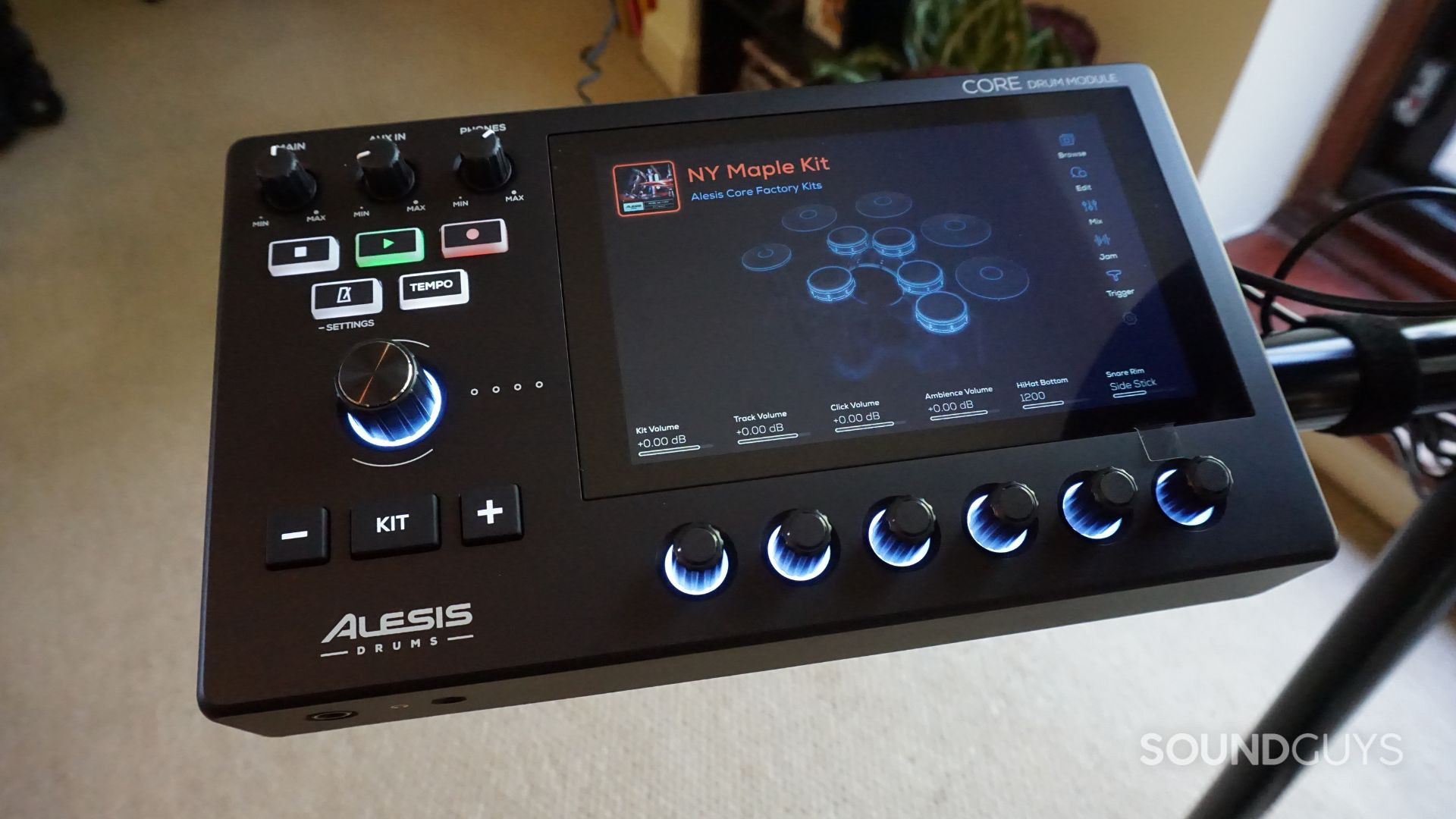
Let’s cut to the chase — there’s lots to like about the Alesis Strata Club. The build quality feels robust, it doesn’t take up too much room, and the 4-post steel rack curves naturally around you. The kit ships with 10 cable wraps to handle dangling wires, and the rack clamps mount with a handy design. Unlike other budget kits, the Strata Club’s clamps use a hinged wingnut system to fasten them to the rack. This is superior, as you don’t need to completely deconstruct the kit and slide the clamps off to reorganize your pads (unlike the Donner DED-200).
Drummers who prefer mesh drum heads over rubber pads will enjoy the Strata Club. They play nicely, and you can alter the rebound by tightening or loosening each drum pad’s six (or four, for the kick drum tower) tension rods. All three mounted drums feature a velocity-sensitive rim sensor, and the 10-inch toms attach to the rack with L-rods. Counterwise, the 12-inch dual-zone snare can be basketed on the included snare stand or attached directly to the rack with the wingnut mount. The 8-inch kick drum tower feels solid underfoot and has ample room to accommodate a double kick pedal if required. Each drum features a ruby red lacquer and chrome black hoops that are aesthetically pleasing.
The Alesis Strata Club feels robust and features aesthetically pleasing ruby red lacquer.
The kit ships with three triple-zone 360° cymbals — a 12-inch hi-hat and crash, and a 14-inch ride. These comprise a vinyl-pattern rubber surface that successfully emulates the response you’d expect when striking real cymbals. You can trigger three unique sounds or articulations by playing the cymbal edge, bow, and bell. The passively powered pedal hi-hat controller is easy to mount, and you can connect the pads in a cinch with the included cable snake. The last accommodates incremental upgrades for an extra pad or cymbal. While these work with compatible third-party triggers, they are likely included to support Alesis’s soon-to-be-released 12-inch drum pad and 16-inch cymbal expansion.
Alesis’s Core drum module is by far the most compelling feature of the Strata Club kit. Borrowed from the Alesis Strata Core, drummers receive 75 factory kits, over 25GB of sounds, and the ability to create unlimited user kits. The interface adorns a 7-inch touchscreen, six encoders, and a comprehensive list of transport controls and buttons. Likewise, the back panel features a list of I/O ports, including an AUX-in for jamming along to your favorite songs. You can also record audio with the stereo and mono-out or track MIDI drums directly with the MIDI-out and USB-B port. Quiet practisers will appreciate the front panel’s 3.5mm and 6.35mm headphone outputs. These support simultaneous audio streaming with stereo headphones.
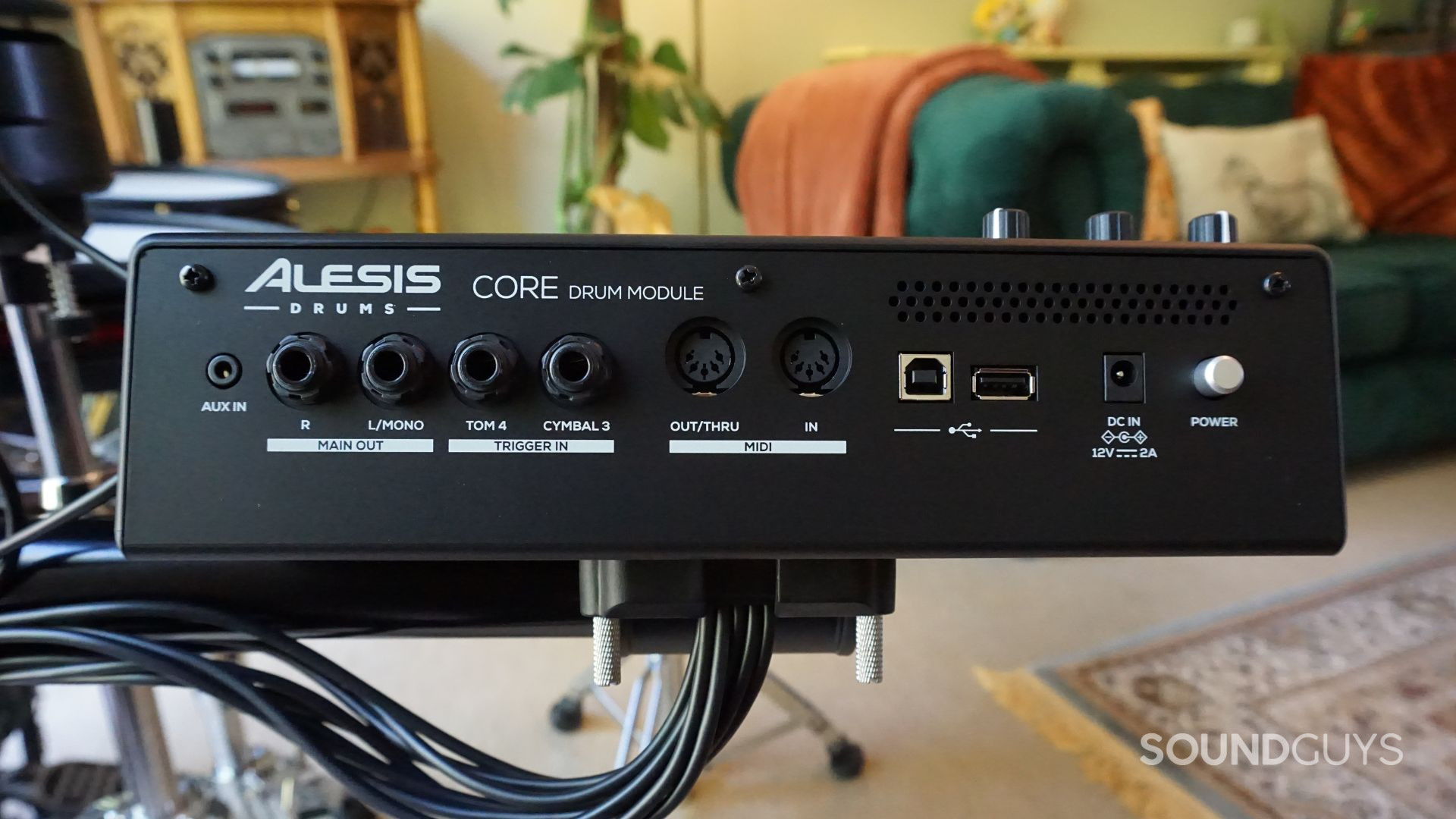
Alesis delivers a myriad of customizations under the hood to keep you from twiddling your thumbs. The right panel on the main screen shows menus for browsing drum kits, editing pads, mixing kit sounds, recording and importing tracks, adjusting triggers, and toggling general settings. The edit menu is the most comprehensive, allowing you to alter many parameters. For example, you can dampen each drum to reduce resonance, increase the attack, adjust the tuning, edit mic levels, and more for each of the 370 available kit pieces. Each pad zone can also stack three samples, and you can toggle the MIDI velocity threshold to decide whether the stack fades or activates when the slider value is reached. You can favorite your preferred samples to find them more easily in the future, and you can import third-party WAV, MP3, and AIFF samples from an external drive.
The mix panel is another excellent accessory and offers “easy” and “advanced” modes. Loading the “easy” interface lists each kit voice horizontally with a touchscreen dial to control panning and a slider to adjust individual pad volumes. With the six encoders, you can toggle volumes for the whole kit, kick drum, snare, toms, cymbals, and ambience. However, switching to advanced mode reveals extra settings for headphone trim, reverb amount, reverb preset, and FX amount. You can assign up to three effects to each pad, including distortion, compression, 8-band EQs, and more. Once selected, the effects can be adjusted with the six small encoders and the touchscreen. Truthfully, there’s a dizzying amount of customization here, but it all feels intuitive thanks to the module’s simple layout and handy controls.
Tinkerers will appreciate the level of customization on offer with the Alesis Strata Club.
Electronic hi-hats are notoriously difficult to set up, but Alesis’s includes a hi-hat calibration feature to help you adjust the playability to your preference. Afterwards, you can fine-tune the “pedal closed” value to set the point at which hi-hat splashes transition to closed sounds. The trigger menu also lets you adjust each trigger input’s response based on your playing style. For example, hard hitters can compensate for their playing by lowering the head sensitivity value. There are other settings for adjusting the trigger curve, head threshold, rim sensitivity, and more. There is an advanced settings menu too, which is handy for programming third-party drum or cymbal triggers from scratch.
Although limited in some respects, recording with the Alesis Strata Club is a breeze. For example, you can connect the stereo outputs to an audio interface or record MIDI directly by linking a computer to the USB-B port. You can also remedy any crosstalk issues within the kit’s trigger menu by selecting “Learn XTalk”. You cannot view and alter MIDI mapping directly from the kit. However, Alesis details each pad’s MIDI note value in the downloadable Core Drum Module User Guide. You can also decide how MIDI cymbal choke settings are registered. These can be set as a specific MIDI note accompanied by aftertouch or sent as a MIDI Off note. However, despite its overwhelming customizations, the Alesis Strata Club is not without its foibles.
What I don’t like about the Alesis Strata Club
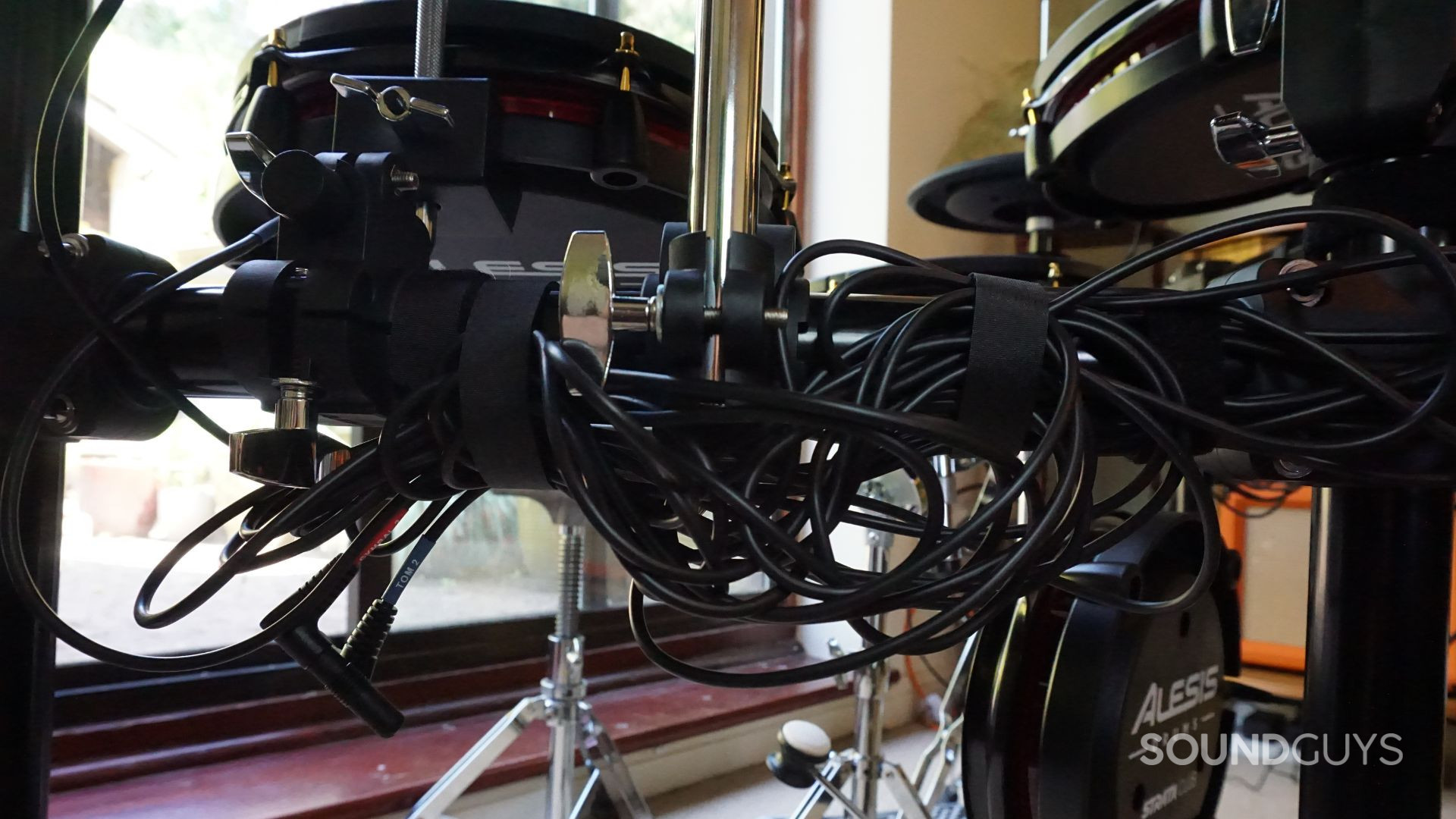
Unlike other affordable brands, the Alesis Strata Club does not ship with a hi-hat stand. Nor does it come with a drum throne, kick pedal, headphones, or drumsticks. That spells bad news for buyers looking for all they need out of the box. However, my biggest gripe is the kit’s short cymbal arms. As per the illustrations in the assembly guide, the two outer crossbars should be attached to the inner vertical posts below the central crossbar. However, after building the frame, I found the cymbal arm holding the crash cymbal was incredibly low. Even after reassembling the rack so that the leftmost crossbar sits above the one in the center, the crash cymbal is lower than I usually like. Sure, my setup isn’t quite that of Travis Barker, but anyone who prefers cymbals high above their drums will find the Alesis Strata Club restrictive.
The limited cymbal arm length isn’t the only problem, either. Positioning the crash and ride cymbals can be tricky because Alesis opted for straight poles instead of boom arms. You can angle the clamps toward you, but they cannot be tilted horizontally. Instead, you must attach the cymbal clamps on the same crossbar and as close to the toms as possible if you prefer having your cymbals set up above the drums. You also lose precious height if you angle the cymbal arms away from the rack. Instead of wrestling with the ones provided, it’s easy to imagine some drummers opting for freestanding cymbal stands.
The Alesis Strata Club's short cymbal arms are incredibly restrictive for players who like their cymbals positioned high above their drums.
It may seem like a boon, but the multi-pin cable snake is unnecessarily long given the kit’s small size. It’s also difficult to store — I had to use four of the 10 included cable wraps on the leftover wiring to ensure I wouldn’t accidentally trip over it later. Not only that, but you’re stuffed if one of the TRS cables breaks from general wear and tear. If it does, you must replace the entire cable snake. The module mount holds the pin connectors and the Core module well enough. However, it feels noticeably cheaper than the kit’s other clamps.
Powering on the Core drum module takes longer than expected. This is presumably a symptom of some internal multi-core processing. However, it takes over 30 seconds to boot up each time. The longer-than-average loading time means you can’t hop behind the kit on the fly like with other competing brands. Another mystery for me rests with the kit’s playlist functionality. While you can create and select kit playlists, navigating back to the home screen lists your playlisted kits alongside the 75 factory kits. I would have preferred a system like the one on the Roland SPD-SX. With it, you can select a kit setlist showing only the kits you want to play. This makes live performance much easier and mitigates the worry of triggering a kit you don’t want.
How does the Alesis Strata Club sound?
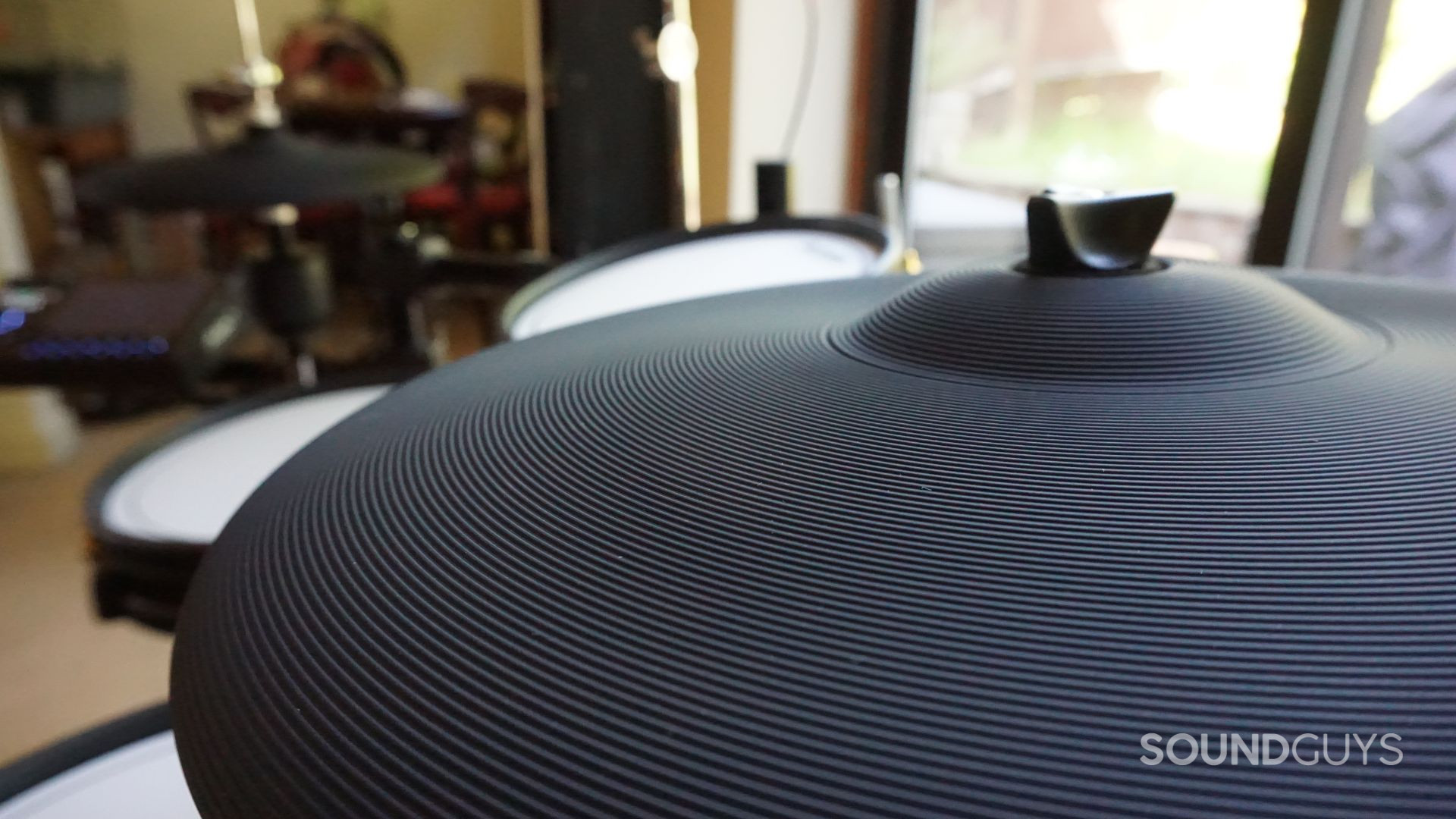
The Alesis Strata Club sounds very good and emulates the sound of an acoustic kit better than rival brands in its price range. The recorded samples are well mixed and have a pleasing dynamic sound. They do a decent job of capturing the natural nuances you’d expect from acoustic drums and cymbals. I didn’t notice any “machine gun” effects caused by identical-sounding drum samples played rapidly during the review period. While the kit names do not necessarily suggest the sound you hear, the list of available factory kits will be decent enough for most drummers. The cymbals decay nicely, but the velocity-sensitive rims do not always register rimshots and cross-sticks.
Below are three recordings of the same groove. These were played using the NY Maple Kit, Binary Cleanse, and Combo Kit 3 factory kits. I recorded each sample in stereo using the two 1/4-inch (6.35mm) outputs on the module’s back panel.
NY Maple Kit sample
Binary Cleanse sample
Combo Kit 3 sample
I left the panning unaltered between each take to showcase the kits fairly. For context, the kick and snare were panned centre, the high tom was panned 15 L, the floor tom was panned 35 R, the hi-hat was panned 25 L, the crash was panned 30 L, and the ride cymbal was panned 50 R.
Alesis Strata Club specs
| Alesis Strata Club | |
|---|---|
Size | 1300 x 1000 x 900 mm |
Weight | 24498g |
Connection | Wired Wireless |
Controls | Touchscreen Endless rotary encoders Master encoder Buttons Knobs |
Audio inputs | 3.5mm AUX 5-pin DIN USB-A |
Audio outputs | 6.35mm mono 6.35mm stereo 3.5mm phones 6.35mm phones 5-pin DIN USB-B |
Wireless audio connection | Bluetooth |
Connector | 12V, 2A Center Positive |
Price | $1599 |
Should you buy the Alesis Strata Club?
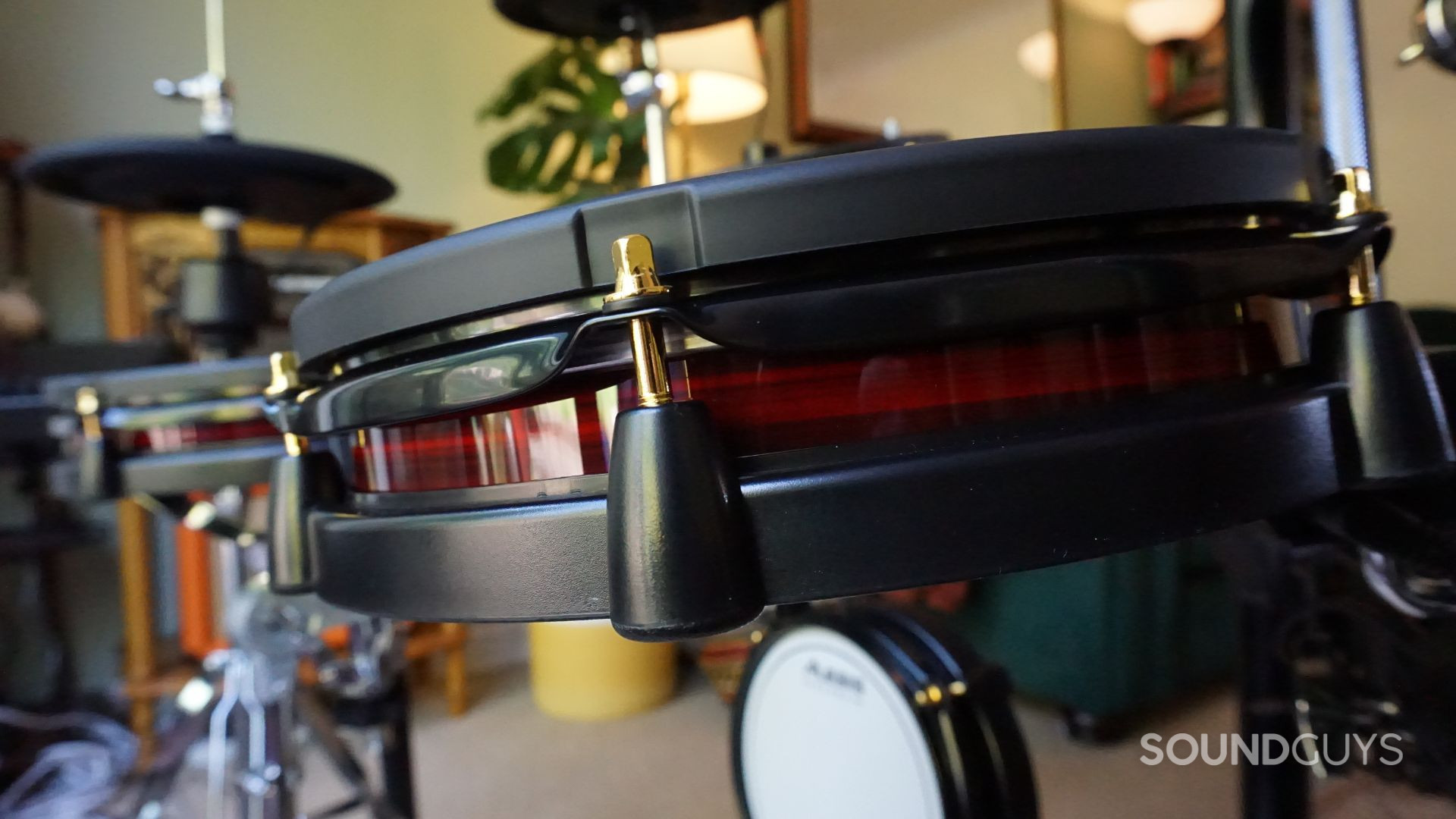
I loved using the Alesis Strata Club specifically because of the 7″ touchscreen. It made navigating the kits’ menus much easier than messing around with master encoders, and it meant the kit had a lot of settings baked in that you would otherwise struggle to use or implement without the screen. Even Roland’s top-tier V71 V-Drums Sound Module doesn’t have a touchscreen display.
The Alesis Strata Club ($1599 at Amazon) holds up against electronic kits that cost twice as much. It’s fun to play, feels robust, and features a head-spinning amount of studio-worthy samples and customizations. The editing and mixing tools are as comprehensive as those commonly used in digital audio workstations (DAWs). Bluetooth audio and WiFi-enabled firmware updates elevate the kit above many similarly priced products in its category. The 10-inch toms and 12-inch dual-zone snare are a welcome size upgrade on other competing brands. Similarly, the triple-zone cymbals are borrowed from the more expensive Alesis Strata Core and Prime kits and feel great under the stick. Setup is simple, and there are no digital USB adapter connections like those found on Roland’s digital cymbals. The kit supports third-party pads and cymbals, all of which can be calibrated easily within the module.
However, Roland’s proprietary digital triggers are incompatible with the Alesis Strata Club. Similarly, the kit’s lack of separate channel routing makes it less suitable for professional live performers. While the Alesis Strata Club ships with a 90-day subscription to Drumeo lessons, beginners will also question the high price tag and lack of fundamental hardware. Realistically, the kit best serves intermediate players looking to upgrade from entry-level models like the Alesis Nitro Mesh or Donner DED-200.


Those looking for simpler kit editing tools and longer cymbal arms will appreciate the new Yamaha DTX6K5-M ($1699 at Amazon). Equipped with 40 factory kits, 200 user kits, and over 700 assignable drum voices, the DTX6K5-M offers flexible sound customization. Unlike Alesis’s touchscreen, Yamaha’s latest kit houses a Full Dot LCD screen and a three-knob modifier for controlling ambience, compression, and effects. The ball-mounted 12-inch 3-Piezo mesh snare and 15-inch positional-sensing ride cymbal are larger than similar rivals. Likewise, the snare and toms use the same hoops as Yamaha’s acoustic drums to emulate a realistic playing feel. The DTX6K5-M also ships with an HS650A hi-hat stand, and all four triple-zone cymbals support edge, bow, and cup sounds. Under the hood, the DTX-PRO module has 10 training functions, 37 jam tracks, and compatibility with the Rec’n’Share iOS/Android App for easy recording.
The Roland VQD106 V-Drums Quiet Design ($1799.99 at Amazon) is excellent for quiet practice in the sub-$2000 category. Labelled as Roland’s quietest V-Drums to date, the VQD106 is reportedly 75% quieter than its sibling e-kits. The pads adorn a honeycomb rubber mesh covering, and the rims wear soft rubber to produce quiet rimshots. The cymbals support bow and edge triggers and the ability to perform mutes by grabbing them. The TD-07 drum module lets you stream music and send MIDI data to music apps via Bluetooth. It also uses around 20 factory kits, 143 drum voices, and 30 unique pad effects. The FD-9 hi-hat control pedal is included, and the compact drum rack is perfect for those short on space. The included Melodics coaching software and free interactive lessons are excellent for beginners. However, the limited I/O ports and customization tools make this kit questionable for recording artists.
Alesis Strata Club review: FAQs
Yes, the Alesis Strata Prime is an excellent electronic drum kit. Equipped with two crashes and four toms, it represents good value for money compared to rival kits from popular brands like Roland. The recorded samples sound excellent, and the module adorns comprehensive I/O ports for live performance and recording.
Yes, the Alesis Strata Prime, Strata Core, and Strata Club support Bluetooth connectivity.
Alesis is owned by the parent company inMusic Brands, Inc., a private company founded by Jack O'Donnell that also owns M-Audio and Akai Professional.
The Alesis Debut kit is designed primarily for children aged 5 to 10.
Thank you for being part of our community. Read our Comment Policy before posting.